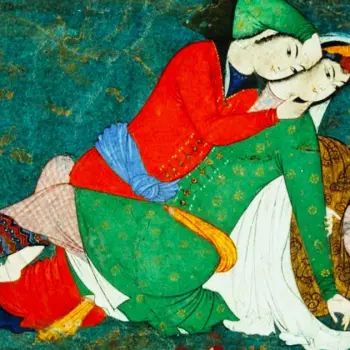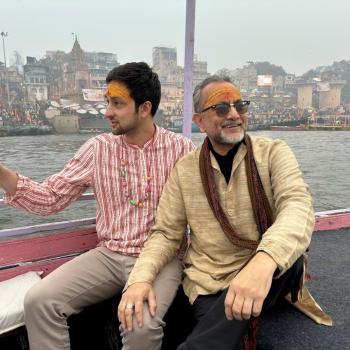 |
|
Go on. Give us a hug.
|
For the past six years, I have compiled a list of positive news stories related to Muslim issues from around the world for altmuslim. I have tried to highlight, in particular, trends and developments in human relations, politics, arts, culture, and media. But good news is sometimes joyful and sometimes bittersweet. Though clouds gather, we must search for silver linings. They are always present and apparent to the optimist and the wisdom-seeker, as surely as springtime buds emerging from winter’s cold bareness (or is that bear-ness?). Anyway, on with the Top Ten Muslim Good News stories for 2007. (See past year’s “Top Ten” lists for 2006, 2005, 2004, 2003, and 2002.)
1. A common word: Muslims reach out to Christians
In a dramatic and groundbreaking display of inter-religious solidarity, 138 of the world’s most senior Muslim leaders, from Sokoto sultan Ababakar to Bosnian mufti Zukoulic, wrote to their Christian counterparts proposing a solid base upon which the two global faiths can cooperate in creating peace and understanding in the world in October 2007. The basis of the letter: the shared belief of both Muslims and Christians in the principles of love of one God and love of the neighbor. Participants hoped that the recognition of this common ground will provide the followers of both faiths a shared understanding that will serve to diffuse tensions around the world.
With over a half of the world’s population consisting of Muslims and Christians, the letter’s authors believe that meaningful world peace can only come from peace and justice between these two faiths. As such, it represents a truly authoritative call for tolerance, understanding and moderation from some of the world’s most influential Islamic leaders and thinkers. In bringing together Muslims from around the world, and from both the Sunni and Shi’a, Salafi and Sufi traditions, it also marks an historic achievement in terms of Islamic unity. The request for further meetings was accepted by Pope Benedict in November and a subsequent message of greetings was sent in time for the Christmas (and Eid) holidays.
2. Celebrating the year of Mevlana
Happy 800th Birthday, Rumi! UNESCO, the United Nations agency for educational and cultural collaboration, designated 2007 as the Year of Mevlana, in honor of the 800th anniversary of the birth of Mevlana Jallaluddin Rumi, the 13th century spiritual master, poet and mystic. Readings, performances, and lectures were held around the world, from California to Amsterdam. In recent times, Rumi has been America’s best-selling poet.
In Konya, where Rumi lived much of his life and died, a major celebration complete with pyrotechnics was staged at the city’s stadium. “We are in urgent need for love and tolerance embodied by Mevlana,” said Ertugrul Gunay, Turkey’s Culture and Tourism Minister, at the Konya event. “We need him in our region, in the Middle East, in our neighborhood, and inside ourselves.” Over 1.5 million pilgrims visit Rumi’s mausoleum in Konya every year. Unfortunately, commemorative events in Balkh (the town in Afghanistan where Rumi was born) were cancelled due to ongoing conflict there.
3. In Pakistan, lawyers emerge as a country’s conscience
In South Asia, we saw two unarmed, sartorially distinct groups marching for freedom: Burmese monks and Pakistani lawyers. While former Prime Ministers Benazir Bhutto and Nawaz Sharif tried to steal the limelight, Pakistan’s 12,000-odd lawyers emerged as that country’s conscience as General Pervez Musharraf sought to prolong and entrench his rule. When the government declared a state of emergency, Pakistan’s legal community remained defiant. As many as 5,000 lawyers who took to the streets across Pakistan were detained, usually after being beaten and tear-gassed.
Among the detained: Aitzaz Ahsan, the 63 year old Cambridge-educated president of the Supreme Court Bar Association, who explained his crime as “making too much noise about democracy under the nose of a military ruler who is backed by the United States.” With the Christian Science Monitor calling the lawyers “Gandhi in leather loafers”, ordinary Pakistanis plied them with flowers and free merchandise. With so much scaremongering these days about “Islamofascism,” Pakistan’s lawyers prove that respect for democracy and the rule of law is more the norm than the exception in Muslim society.
4. A journalist exposes the underbelly of a dictatorship
The October murder of Alisher Saipov could not be considered, in itself, “good news”. But, one can only marvel at the young Central Asian journalist’s uncommon courage. A mere 26 years old, he edited the only Uzbek-language media outlet committed to exposing human rights abuses under Uzbek leader Islam Karimov, whose security apparatus had labeled him a “terrorist”. An eyewitness to the 2005 Andijan massacre of hundreds of protesters, Saipov reported for Voice of America and Siyosat, the newspaper he oversaw which couriers smuggled into Uzbekistan.
Gunned down outside his office in the Kyrgyz city of Osh, Saipov was described by friends as decent, brave, intelligent, and idealistic. “Oppressors thrive,” he said in a recent interview, “when they can rely on a fearful populace and their methods go unchallenged.” Saipov believed that “the duty of a journalist is to give people hope by not giving in to fear.”
5. In London, a concert for peace in Darfur
Dubbed the Muslim “Live8”, an October concert in the UK’s Wembley Arena drew over 10,000 people to raise funds and awareness for the humanitarian crisis in Sudan’s Darfur region. The unprecedented concert featured some of the biggest acts in contemporary Muslim music, including the Britain’s Sami Yusuf, the Danish trio Outlandish, the American country musician Kareem Salama, as well as famed Bollywood ubermusician AR Rahman.
“This is a positive response to the terrible situation in Darfur and Africa in general,” said Waaliur Rahman, CEO of record label Awakening, and organizer of the event, “a response that allows ordinary people to get involved and do something about it”. Co-organized by the charity Islamic Relief, the event raised several million dollars. Four million people in Darfur, two-thirds of the population, are dependent on humanitarian aid for their survival. The success of the event overturns a couple of key misconceptions – that Muslims care little about injustice when Muslims are the perpetrators (though Muslims are victims as well in Darfur) and that Muslims cannot find a constructive place for music in their lives (see story number 9).
6. The pioneering Amman Message is declared
An initiative of the King of Jordan, the Amman Message is a consensus document that has sought to tackle the theological basis of religious extremism in the Muslim world. Over 500 of the most senior Islamic scholars from around the world, representing all the major branches and schools of Islamic thought, have endorsed the Amman Message and its Three Points, which clarify, among other things, who is a Muslim and who has the right to issue fatwas (legal rulings). British Muslim writer Yahya Birt says that the Amman Message can “form the basis of global Muslim unity, the grounds for the advancement of peaceful Muslim relations, and an endorsement of the means by which religious scholarship moderates extremism in matters of religious interpretation.”
Organisers of the Amman Message describe it as “good news not only for Muslims, for whom it provides a basis for unity and a solution to infighting, but also for non-Muslims. It thus assures balanced Islamic solutions for essential issues like human rights, women’s rights, freedom of religion, legitimate jihad, good citizenship of Muslims in non-Muslim countries, and just and democratic government. It also exposes the illegitimate opinions of radical fundamentalists and terrorists from the point of view of true Islam.” For a religion that bases so much of its practice on ijma (consensus), the Amman Message may be the spark that helps forge consensus on many other pressing issues throughout the Muslim world.
7. Funny Muslims: Groundbreaking sitcoms air on TV
In North America, two mainstream television sitcoms with positive characters and themes are promising to humanize Muslims on the small screen. “Little Mosque on the Prairie” follows a Canadian Muslim congregation in small-town Saskatchewan, while “Aliens in America” has Raja Musharraf, a Muslim exchange student from Pakistan, breaking bread with his American host family and making a splash at his Wisconsin high school. “Little Mosque on the Prairie,” a play on the hit 1970s show “Little House on the Prairie,” debuted in January 2007 on Canadian television to a record-breaking two million viewers. Networks in Israel, France and Turkey have already signed up to air the sitcom. Episodes of “Aliens in America”, which has aired on America’s CW network since September 2007, have included Raja convincing a class flirt to dress modestly and refusing (as a convenience store clerk) to sell beer to underage drinkers.
“Aliens” is the first mainstream comedy aimed at an American teen market that directly confronts issues around the phenomenon of Islam in America.” “Little Mosque” creator Zarqa Nawaz, a mother-of-four from Regina, Saskatchewan, cut her teeth directing documentaries and short films and has just completed work on the second season of her hit show. Her success is inspiring scores of other Muslim filmmakers to follow in her footsteps.
8. India takes a step toward addressing disparities
At 150 million plus, India has the world’s second largest Muslim community after Indonesia. However, Indian Muslims suffer from high levels of poverty and low levels of opportunity. After years of neglect, the Indian government finally took the modest but important action of studying the scope of problems that India’s Muslims face. What the government panel known as the Sachar Committee found was not pretty, but the mere fact that an official baseline has been established is cause for hope.
A stark finding is that Dalits – formerly the most marginalized of communities – have leapfrogged Muslims in literacy, education, and in the workplace. Among the positive findings of the commission: the demand for a better quality education among Muslim families is high but unmet, and Muslims have the best sex ratio (i.e. lowest cases of selective abortion targeting females) of all groups. Additionally, the report revealed that given proper resources, Indian Muslims can perform as well as any other community in India.
9. The brewing revolution in Muslim music
Music has always been a contentious issue in Islamic theology, in part, perhaps, because the faith has always recognized music’s tremendous power. These days, English-language musicians have embraced a variety of genres, from hip-hop (Lupe Fiasco, Kumasi) to country (Kareem Salama) to folk (Dawud Wharnsby) to pop (Sami Yusuf, Yusuf Islam). This year also saw a new genre of taqwacore Muslim punk musicians, including the Kominas, tour the United States performing to mostly Muslim crowds. The times, they are a-changin’ indeed.
Although these and other talented bards have explored an American or European Muslim identity in their art, they have also had an impact globally. Armed with sophisticated lyrics and strong melodies, they have captured the zeitgeist. These bards are the vanguard of what one observer has declared a Harlem Renaissance in the making, a renaissance that will have all sectors of Muslim society revisiting their own views on music – whether they approve of it or not.
10. A nascent movement for deaf Muslims
Deaf Muslims, like deaf people everywhere, face many barriers to education and participation. As awareness spreads about those challenges, a growing number of initiatives are beginning to address the needs of the hearing-challenged within the Muslim world. Groups like the US-based Global Deaf Muslims are working to establish universal hand signs for Islamic words and concepts. In Holland, a Dutch organization that assists deaf children developed 163 Islam-related signs so parents could communicate with their children. The Canadian Association of Muslims with Disabilities (CAMD) wants to improve access for people with disabilities to texts, classes, and services. And such movements aren’t limited to Western countries. In Egypt, a new NGO called Sarkha (Cry), provides interpreters for mosque services for Cairo’s deaf community. In Lebanon, the Al-Hadi Institute for the Deaf and Blind has provided opportunities for young deaf Muslims to express themselves artistically. Al-Hadi has staged art exhibitions for works by its students.
In the UK, the Muslim Youth Helpline has held the first ever Muslim Deaf Awareness day. A few mosques are beginning to cater to deaf congregants with the help of the Muslim Deaf Group (MDG). The MDG hosts an internet forum as well as monthly talks at mosques in London, Manchester, and Leeds. The Muslim Deaf Sisters Project has been working to translate the Quran into British Sign Language. Endeavours such as these are helping promote an awareness and understanding of hearing-impairment issues that is often lacking in Muslim societies. Small steps, perhaps, but good news nonetheless.
Mas’ood Cajee, a regular contributor to altmuslim.com, is a a former California Endowment Scholar at Harvard University who practices dentistry in northern California. He is currently researching the stories of Muslim rescuers of Jews during the Nazi Holocaust. He can be reached at .(JavaScript must be enabled to view this email address)
//’;l[1]=’a’;l[2]=’/’;l[3]=”;l[21]=’\”‘;l[22]=’ 109′;l[23]=’ 111′;l[24]=’ 99′;l[25]=’ 46′;l[26]=’ 111′;l[27]=’ 111′;l[28]=’ 104′;l[29]=’ 97′;l[30]=’ 121′;l[31]=’ 64′;l[32]=’ 101′;l[33]=’ 101′;l[34]=’ 106′;l[35]=’ 97′;l[36]=’ 99′;l[37]=’ 109′;l[38]=’:’;l[39]=’o’;l[40]=’t’;l[41]=’l’;l[42]=’i’;l[43]=’a’;l[44]=’m’;l[45]=’\”‘;l[46]=’=’;l[47]=’f’;l[48]=’e’;l[49]=’r’;l[50]=’h’;l[51]=’a ‘;l[52]=’= 0; i=i-1){
if (l[i].substring(0, 1) == ‘ ‘) output += “&#”+unescape(l[i].substring(1))+”;”;
else output += unescape(l[i]);
}
document.getElementById(‘eeEncEmail_chigfrIzwz’).innerHTML = output;
//]]>
.















